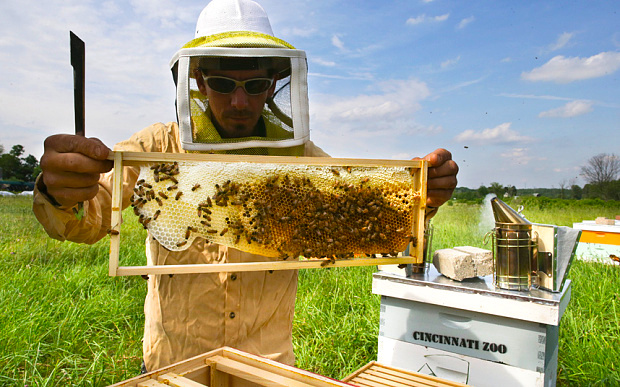Regarded as heaven-sent totems of hard-work and obedience in Greece and royal symbols for lower Egypt, honeybees’ humble, hard-working image has been well-documented in folk songs and fairy tales. At the same time, Winnie the Pooh’s love-hate relationship with bees mirrors human beings’ friend-foe interaction with them.
Many people’s first encounters with bees are negative, but coffee-loving human beings are in no way less dependent on bees than Pooh, the iconic British honey-loving bear. As minute and insignificant our bees seem, they are the main pollinators controlling the harvest of coffee and over other 70 crop species out of the 100 which provides 90% of world’s food.
Once referred to as the ‘most invaluable species on the planet’ by Earthwatch, bees are currently in rapid decline due to habitat loss, disease and over-exposure to neonicotinoid pesticides. What are the solutions to UK’s food security catastrophe? How should we live in harmony with bees?
Almost half the world’s produce, equivalent to over 2 billion tonnes, ends up as waste every year, while 842 million people live in hunger. Yesterday (29 October), Brighton relived the Biblical miracle Feeding of the 5000 during lunchtime at The Level, as 5000 lunches made out of food that would otherwise have been wasted were served, free of charge.
Organised by a group of local organisations including Brighton & Hove Food Partnership, Brighton & Hove City Council, Real Junk Food Project, University of Sussex Students’ Union and University of Brighton with guidance and support from Feedback, the surplus celebration illuminates regional food waste issues.
“If food waste was a country it would be the third largest carbon emitter after China and the US, “ says Caroline Lucas, Green party MP for Brighton Pavilion, giving her support to the event.
While most campaigners’ speeches focused on cutting down food waste at a community level, a bee activist group diverted public attention to what the government can do to protect bees, which were killed at an alarming rate of 37 million a month on average last year.
At the event, a bee activist told the Guardian: “Damaging bees’ health and separating their colonies intentionally through using neonicotinoids is no different from trampling on bees’ dignity”.
Referring to a research published in University of Reading earlier this year revealing that bees contribute £651 million to the UK economy a year, £150 million more than the Royal Family brings in through tourism, he shed tears for the lack of conscience in farmers who use pesticides merely to maximize yields for short-term economic incentives.
Vegan Group also expressed concern over large commercial operations replacing honey – bees’ primary source of nutrients – with a cheap sugar substitute for the bees to get through winter. Some beekeepers even burn the beehives, killing all the bees inside, before winter to reduce cost. Population decline and colony collapse of bees clearly indicates an unsustainability towards future crop yield.
When the controversial neonicotinoid ban was temporarily lifted in some parts of the country July this year, Friends of the Earth campaigner Paul de Zylva argued: “It’s scandalous that the government has caved in to pressure and given permission for some farmers to use banned pesticides”.
Describing a future without bees, Nicholas Balfour, PhD student of the Laboratory of Apiculture and Social Insects (LASI) at University of Sussex said: “A third of everything we eat is pollinated by bees. Although other social insects like flies can pollinate, they are not attracted to the same flowers as bees. This loss of biodiversity would reduce the variety of food we can choose from”.
Dr Mike Garratt from the University of Reading added that focusing only on wild bees that had financial value today for agriculture would be a mistake. “Too much focus on pollination may lead to neglect of rarer species that could be important in the future,” he explained. This further justifies why money should not be the only concern for food producers.
To address food security issues stemming from bees population decline, Professor Francis Ratnieks and his team from the University of Sussex launched a research on effects of honey bees on apple pollination. They decode a waggle dance – the language through which honey bees communicate.
“By analysing the speed and angle of the waggle dances, we can determine where the flowers are”, said Ratnieks.
His findings revealing that caffeine boosted bees’ memories of the location of a flower were further developed by Dr. Margaret Couvillon at the University of Sussex.
Her team found that caffeine attracted bees, causing them to behave as though the nectar source was of higher quality and richer in sugar. Bees also did their waggle dance – a behaviour to recruit other bees – four times more often.
“These new findings are a reminder that, while mutually dependent, the interests of plants and pollinators don’t always align,” says Couvillon. Published in the Cell Press journal Current Biology on 15 October, these findings provide a potential solution for the aggravating food security crisis.
By adding lacing nectar with caffeine, pollination can be manipulated, for example, by a farmer to increase yields of a particular crop. As bees are less likely to find other sources than caffeinated flowers to pollinate, this would help us manage and adjust landscapes in order to maximize crop productivity.
According to statistics from United Nations’ in 2015, world produces enough food for everyone, yet poor distribution implies that 805 million people go hungry. When will our world learn the importance of cutting down food waste? Will this research spark discussion on unequal food distribution around the world?
Bee activists strongly urge the government to take action on bee conservation on a national level and enforce the ban on pesticides. It is hoped that this study will shed light on global hunger issues and offer a honey-flavoured solution to the world.
Dorothy Yim, Science Editor

